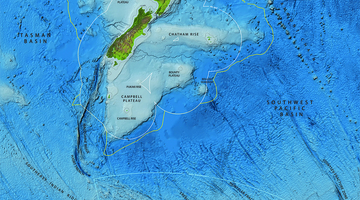This introductory video by the Sustainable Seas National Science Challenge shows the wide collaborative effort to involve diverse communities in developing ecosystem-based management (EBM).
Transcript
Andrew Baxter, Technical Advisor – Marine, Department of Conservation
You can’t work in this field without having a love or passion for the coast.
Rosalind Squire, Coastal Consent Planner, Tasman District Council
I love fishing, diving, sailing.
Allyn Glaysher, General Manager Corporate Affairs, Moana New Zealand
I love playing in the water, I love eating the kaimoana that comes out of the water. I have a family – my kids love to do the same thing.
Julie Hall, Director, Sustainable Seas Challenge
I grew up by the sea. I’ve been an oceanographer, active in marine research, and I believe the marine environment is really, really critical to us.
Daren Horne, Te Ātiawa Director, Tiakina Te Taiao Board
It brings life, it gives life, it takes life. We live to be a part of that.
Sir Rob Fenwick, Chair of the Board, Sustainable Seas Challenge
So it’s absolutely fundamental that we understand how to protect this marine environment for future generations of New Zealanders.
The Sustainable Seas National Science Challenge really brings together the very best of New Zealand’s scientists and experts to underpin our knowledge and the development of new tools for ecosystem-based management.
Julie Hall
Ecosystem-based management is a holistic approach to managing an environment – in this case, the marine environment – where you are looking not at a single activity but all the activities that are going on in the environment and all the values that people hold for that environment.
Blake Hornblow, Youth Representative, Stakeholder Panel, Sustainable Seas Challenge
And I think this is like revolutionary. I think it’s ahead of the game, and it’s definitely the start of something really, really important. And through this Challenge, if we can maintain the biodiversity, maintain the health of the ecosystem, the more resilient it’s going to be.
Allyn Glaysher
The health of the marine environment is incredibly important for the success of our business. But to achieve that, we are just one stakeholder, and we recognise that we need to work really closely with all the other stakeholders nowadays to achieve what we think is a common goal.
Andrew Baxter
You know, from iwi to scientists to stakeholders to environmental groups, councils and the Department of Conservation, and I think there is a lot of commonality of objectives and values and what people want to achieve.
Daren Horne
The sea is the interest of all iwi. We are taught by our elders to kaitiaki of the whenua, of the moana and te taiao, not just for our own time here. We want our grandchildren to tell their grandchildren. We want them to be able to swim in the sea, live off the sea, live off the land, forever.
Sir Rob Fenwick
This Challenge looks at offshore mining, it looks at oil and gas exploration, looks at tourism, looks at fishing and of course it looks at conservation, and what we need to ensure is that there is enough of the ecosystem that is healthy and left behind for future generations.
Rosalind Squire
We need the models and the tools and the information in order to better assess the effects of those activities. And it’s not all about economic benefit. It’s about balancing all those competing demands.
Julie Hall
The Challenge is unique in the way it brings together such a wide variety of people – the social scientists, the economists, the policy people, the biophysical scientists, those with mātauranga Māori knowledge – but also brings in the stakeholders – the industry, the NGOs, Māori and the public. We’ve got around 120 researchers over 26 organisations who are all really committed to providing the underpinning science and knowledge for ecosystem-based management in New Zealand. Ecosystem-based management is not a one size fits all but is very place-based, so taking the processes and knowledge and applying those in another area will be really important.
Rosalind Squire
If we are going to move forward as a community, we need to do things differently.
Blake Hornblow
To have our values questioned and then decide on what’s really important.
Daren Horne
We are only here for a short time, and we’ve got a long way to go, and we have to go there together.
Andrew Baxter
In other words, we need to actually make a big step, a bold step and make a difference.
Allyn Glaysher
It is a challenge but it’s also a massive opportunity.
Sir Rob Fenwick
It will be a breakthrough for the way in which we extract resources from the ocean on a sustainable basis.
Acknowledgements
Cawthron Institute
GNS Science
NIWA
University of Auckland, Faculty of Science, School of Biological Sciences
University of Canterbury
University of Waikato
University of Otago
Victoria University of Wellington
Moana New Zealand
Dive Tutukaka
Nelson Tourism
NZ Story


